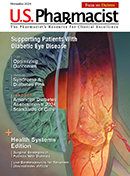US Pharm. 2020;45(5):31-34.
Loss of smell and taste has been anecdotally linked to COVID-19 infections. In a study published in International Forum of Allergy & Rhinology, researchers at University of California (UC) San Diego Health report the first empirical findings that strongly associate sensory loss with COVID-19, the respiratory disease caused by the novel coronavirus.
“Based on our study, if you have smell and taste loss, you are more than 10 times more likely to have COVID-19 infection than other causes of infection. The most common first sign of a COVID-19 infection remains fever, but fatigue and loss of smell and taste follow as other very common initial symptoms,” said Carol Yan, MD, an otolaryngologist and head and neck surgeon at UC San Diego Health. “We know COVID-19 is an extremely contagious virus. This study supports the need to be aware of smell and taste loss as early signs of COVID-19.”
Dr. Yan and colleagues surveyed 1,480 patients with flu-like symptoms and concerns regarding potential COVID-19 infection who underwent testing at UC San Diego Health from March 3 through March 29, 2020. Within that total, 102 patients tested positive for the virus and 1,378 tested negative. The study included responses from 59 COVID-19–positive patients and 203 COVID-19–negative patients.
Dr. Yan said the study demonstrated the high prevalence and unique presentation of certain sensory impairments in patients positive with COVID-19. Of those who reported loss of smell and taste, the loss was typically profound, not mild. Encouragingly, however, the rate of recovery of smell and taste was high and occurred usually within 2 to 4 weeks of infection.
“Our study not only showed that the high incidence of smell and taste is specific to COVID-19 infection, but we fortunately also found that for the majority of people sensory recovery was generally rapid,” said Dr. Yan. “Among the COVID-19 patients with smell loss, more than 70% had reported improvement of smell at the time of survey, and of those who hadn’t reported improvement, many had only been diagnosed recently.”






